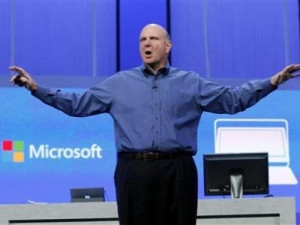
The announcement that Microsoft intends to purchase Nokia's handset division came as a complete surprise to absolutely no one. Some of the details are a little surprising, but the end game for the fallen Finnish hero was written on the wall in large clear letters in September 2010, when Stephen Elop left Microsoft to take the CEO job at Nokia.
Inevitable the step may be, but it is also a vital one, and one which may be key to Microsoft's own turnaround strategy. The timing of the deal was always going to be sensitive, but it is probably not tied to Steve Ballmer's announced retirement - this strategy was set in place long ago.
Pundits are hoping this is another major step in a rejuvenated Microsoft strategy, and one that will continue to show bold steps. Shaking up the company, replacing the CEO, and making big acquisitions...these are signs of something, but history will judge whether they are bold signs of a giant striding purposefully back into the lead, or the helpless threshing of a beached whale.
Hastening the mobile turnaround
Elop may never escape the suspicions that he was a Trojan horse all along - a mole sent into Nokia with two objectives: convert the erstwhile smartphone giant to Windows Phone, and erode its market value to make the inevitable Microsoft acquisition cheaper. But the truth is probably simpler. Microsoft couldn't really lose, no matter what Elop did. If he succeeded as CEO of Nokia, it would mean the company had regained market share and established Windows Phone in the market. If he failed, the phone maker would be ripe for salvage.
A vague middle ground, on the other hand, helped no one, and Microsoft was clearly not content with the analysts' predicted 10-12% market share for Windows Phone. So the only question left was timing. Microsoft and Nokia allegedly had several meetings in recent months to discuss acquisition, but could not agree on price until now.

What will Microsoft do with Nokia's handset business, and what does this mean for the other manufacturers? Tablet OEMs were decidedly unimpressed with Microsoft when it launched its own range of tablet PCs in direct competition with its partners. Phone partners Huawei, Samsung and HTC are likely to be watching the Nokia deal very closely indeed. Microsoft may not be too concerned about that: Nokia was by far the leader in the nascent Windows Phone market share, but while some may see that as the only seed worth nurturing, it will not abandon its partners too quickly. Google, after all, owns Motorola Mobility and makes its own phones, but still fosters a healthy phone OS partner ecosystem.
Microsoft has all the ingredients to grow its third-place slice in the smartphone pie. While the Nokia deal will mean some pain - Microsoft really doesn't need all those Nokia staff, and it certainly doesn't need a dumbphone line-up - the company is well positioned to get its reorganised act together and start to actually execute on its potential.
Not just smartphones
Mobile is only one part of the Microsoft business that needs attention. Closely related is the tablet business, and tied to that in turn is the core OS strategy. Windows RT has been a disaster from the start and it is a millstone around the company's neck. Microsoft needs to ditch RT, fix the Windows 8 glitches, and get a more attractive tablet/mobility strategy into the enterprise market as fast as it possibly can.
On the OS side, the company needs Windows 8.1 to clean up its act in a big way. It's competing with products which have had several generations to get the basics right - it doesn't have that luxury. In particular, Microsoft needs to become a great deal more agile about taking feedback on board and releasing OS updates on a more rapid, regular schedule. The dreadful five-year lag for Vista could be swept under the monopoly carpet, but against annual (at a maximum!) updates to iOS and Android, the Windows team needs to become a lot nimbler and more responsive to the needs of its users.
Silver linings
The server and tools business, a perennial cash cow, needs to come to the cloud party post-haste. Spooked by the growing excitement around cloud computing of the Amazon and Google variety, Microsoft followed suit with its own Azure platform.
That would have left it a late player in a big commodity market with many strong players, but fortunately customers have gifted Microsoft a window of opportunity: the growing interest in hybrid cloud computing could play neatly towards Microsoft's strengths, and it is well positioned to deliver a tightly-woven suite of products and services that extends from its server/hypervisor position in data centres through to the cloud, covering every hybrid combination in between. Instead of fighting Google and Amazon on their terms, it can take on Oracle, VMWare and the rest with home ground advantage.
Don't fix what ain't broke

Many other parts of Microsoft are doing fine and just need to keep executing. The company has built a strong developer ecosystem and can build on that strength (and evolve it, with Azure) so long as it doesn't do something dumb, like releasing a hotly-anticipated OS upgrade without giving developers early access to do testing. Similarly, its entertainment division (ie: Xbox) is doing well, becoming nicely profitable and giving rivals a tough time, and is set to continue onwards and upwards so long as the company doesn't do something silly like announce wildly unpopular "features" and give its chief rival an open invitation to punch it in the head in public. This shake-up is a work in progress, obviously.
All of this points to a Microsoft which is determined not to join the list of other technology giants which lost their way and either went to the wall or survived as a shadow of their former selves. It's taking big steps to reinvent itself while it's still healthy and has the vigour to do so. Observers are divided, some critical, some optimistic, some cautious. Are you convinced?
Share